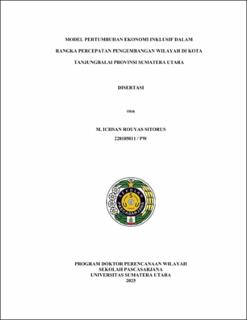Model Pertumbuhan Ekonomi Inklusif dalam Rangka Percepatan Pengembangan Wilayah di Kota Tanjungbalai Provinsi Sumatera Utara
Inclusive Economic Growth Model in Order to Accelerate Regional Development in Tanjungbalai City, North Sumatra Province

Date
2025Author
Sitorus, M. Ichsan Rouyas
Advisor(s)
Lubis, Satia Negara
Sembiring, Meilita Tryana
Kesuma, Sinar Indra
Metadata
Show full item recordAbstract
This study develops a Bottom-Up Inclusive Growth Model to examine the structural
pathways linking participatory planning, inclusive economic growth, and regional
development in peripheral coastal cities of post-decentralized Indonesia. Using the
case of Tanjung Balai, the research investigates whether citizen participation in
planning processes significantly contributes to equitable economic and spatial
outcomes in marginalized urban areas. Employing Partial Least Squares
Structural Equation Modeling (PLS-SEM), the study analyzes data from
stakeholder surveys and secondary development indicators. Results show that
participatory planning has a direct and significant effect on inclusive growth (β =
0.614) and regional development (β = 0.390), with inclusive growth also mediating
the relationship (β = 0.422). The model exhibits robust explanatory power (R² =
0.378–0.532) and predictive relevance (Q² = 0.235–0.357). The findings offer a
replicable framework for enhancing planning effectiveness in coastal regions,
providing empirical support for integrating participatory governance into inclusive
development agendas. The model is applicable for policy alignment with SDGs 1,
10, and 11, particularly in resource-constrained and spatially disadvantaged
settings.
